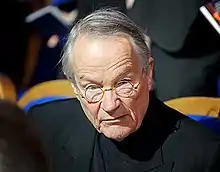Peter Stein
Peter Stein (born 1 October 1937) is a German theatre and opera director who established himself at the Schaubühne am Lehniner Platz, a company that he brought to the forefront of German theatre.[1]
Peter Stein | |
|---|---|
 Peter Stein, 2015 | |
| Born | 10 October 1937 Berlin, Germany |
| Occupation |
|
| Spouse(s) | Maddalena Crippa |
Biography
Born in Berlin, Stein grew up in an era defined by the Nazis. His father, Herbert Stein, was factory director of Alfred Teves, a motorcycle manufacturing firm that the Nazi regime employed to make automotive parts. Herbert was in charge of 250,000 forced laborers. He was also involved in the Confessing Church, a resistance group.
Stein has said that these events had a profound effect on his life. After the war, his father was sentenced to two years of forced labor for collaborating with the Nazis. Stein's academic performance nosedived and he barely made it into Frankfurt University. He then moved to Munich and enrolled at university there, pursuing a PhD thesis on the works of E. T. A. Hoffmann.
Having been curious about the theatre since his time in Frankfurt, he became a stagehand in Munich and eventually earned other parts. Proving himself, he was hired as director for Saved by Edward Bond. This piece threw him into the limelight and was critically acclaimed. Politically driven, Stein went on to direct many politically charged pieces, including Vietnam-Discourse by Peter Weiss, Bond's Early Morning, Seán O'Casey's Cock-a-Doodle Dandy, The Changeling by Thomas Middleton, and William Rowley and Goethe's Torquato Tasso.
The theatre where Stein originally worked in West Berlin was the Schaubühne am Halleschen Ufer.
In 1970, Stein was selected by politicians in Berlin to take over the Schaubühne, running it as an egalitarian socialist democracy.
After the end of his relationship with partner Jutta Lampe in 1985, Stein left the Schaubühne.
Stein has also directed operas, such as Rheingold in Paris, 1976 (conducted by Georg Solti); Otello for the Welsh National Opera in 1987; and Moses und Aron for the Salzburg Festival, 1996 (conducted by Pierre Boulez). In 2011, he directed a new production of Verdi's Macbeth for the Salzburg Festival, with Riccardo Muti conducting, and in 2013 he directed Verdi's Don Carlos in Salzburg. He was awarded the Europe Theatre Prize in 2008.[2] He is married to Italian actress Maddalena Crippa.[3]
In 2019, Stein directed a production of Le Misanthrope with Lambert Wilson at the Le Comédia theatre in Paris.[4]
Major productions
Productions without a specified location were at the Schaubühne Berlin.[5]
- 1967 – Gerettet by Edward Bond (West German premiere), adapted by Martin Sperr, at the Werkraumtheater of the Munich Kammerspiele.[6]
- Kabale und Liebe by Friedrich Schiller at the Theater Bremen, with Michael König as Ferdinand, Edith Clever as Luise, Jutta Lampe as Lady Milford, Kurt Hübner as the President, and Bruno Ganz as Wurm.[6]
- 1968 – In the Jungle of Cities by Bertolt Brecht at the Werkraumtheater of the Munich Kammerspiele, with Hans Korte as Shlink, Bruno Ganz as Garga, Edith Clever as Marie, and Dieter Laser as Wurm.[6]
- Vietnam-Discourse by Peter Weiss, co-directed with Wolfgang Schwiedrzik, at the Werkraumtheater of the Munich Kammerspiele, with Wolfgang Neuss as the Compère.[6]
- 1969 – Torquato Tasso by Johann Wolfgang von Goethe
- 1970 – The Changeling by Thomas Middleton and William Rowley
- 1971 - Die Auseinandersetzung by Gerhard Kelling
- 1972 – Optimistic Tragedy by Vsevolod Vishnevsky
- Fegefeuer in Ingolstadt by Marieluise Fleißer
- Prinz Friedrich von Homburg by Heinrich von Kleist
- 1973 - The Piggy Bank (Das Sparschwein) by Eugène Labiche
- 1974 - Antikenprojekt I - 1. Abend: Übungen für Schauspieler
- Die Unvernünftigen sterben aus by Peter Handke
- Sommergäste by Maxim Gorky
- 1976 - Shakespeare´s memory – 2 evenings
- 1977 – As You Like It by William Shakespeare
- 1978 - Trilogie des Wiedersehens by Botho Strauß
- Big and Little (Groß und klein) by Botho Strauß, world premiere with Edith Clever as Lotte
- 1980 – Antikenprojekt II: Oresteia by Aeschylus
- 1981 - Klassenfeind by Nigel Williams, German premiere
- Nicht Fisch nicht Fleisch by Franz Xaver Kroetz
- 1982 - Der Streit / Die Aufrichtigen by Pierre Carlet de Chamblain de Marivaux
- 1983 – Die Neger by Jean Genet
- 1984 – Drei Schwestern by Anton Chekhov
- 1986 - The Hairy Ape (Der haarige Affe) by Eugene O'Neill
- 1989 - Der Kirschgarten by Anton Chekhov
- 1990 - Roberto Zucco by Bernard-Marie Koltès, world premiere. Reviews of the production at , , and
- 1992 – Julius Caesar by William Shakespeare
- Pelléas et Mélisande by Debussy; Welsh National Opera 1992; conductor Pierre Boulez
- 1994 – Antony and Cleopatra by William Shakespeare
- 1998 – Hamlet by William Shakespeare
- 2000 – Faust I & II by Johann Wolfgang von Goethe
- Simon Boccanegra by Giuseppe Verdi (at the Salzburg Easter Festival)
- 2003 – Die Möve by Anton Chekhov
- 2005 – Blackbird by David Harrower
- 2006 – Troilus and Cressida (Shakespeare) and Mazeppa (Tchaikovsky/Burenin)
- 2007 – Electra by Sophocles
- 2010 – Oedipus at Colonus by Sophocles; Salzburg Festival; with Klaus Maria Brandauer as Oedipus
- 2011 – Macbeth by Verdi; Salzburg Festival; conductor Riccardo Muti
- 2010 – Don Carlos by Verdi; Salzburg Festival; conductor Antonio Pappano
- 2013 – Le prix Martin by Eugène Labiche, Odéon-Théâtre de l'Europe, Paris
References
| Wikimedia Commons has media related to Peter Stein (theatre director). |
Notes
- Patterson (1981, xiii).
- XIV Edition – Prize winners Europe Theatre Prize
- Enrico Lancia, Roberto Poppi (2003). Dizionario del cinema italiano, Le Attrici. Gremese Editore, 2003. ISBN 888440214X.
- Le Misanthrope, Le Comédia, 2019
- Chronology of the premieres since 1962/63 Schaubühne Berlin
- Patterson (1981, 172).
Sources
- Patterson, Michael. 1981. Peter Stein: Germany's Leading Theatre Director. Directors in Perspective ser. Cambridge: Cambridge UP. ISBN 0-521-29502-5.